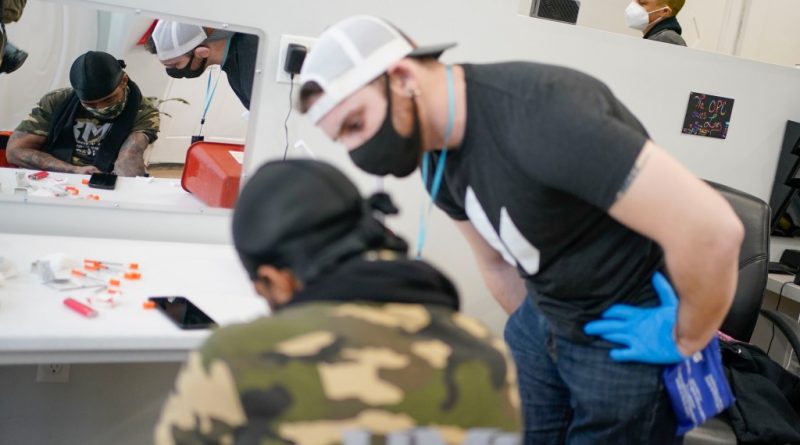Colorado drug policy debate in state legislature
Colorado lawmakers are again weighing how to use criminal penalties and protections to staunch the addiction crisis, this time with a trio of bills that some argue have competing aims.
The renewed debate comes a year after untold hours of public and private wrangling over a landmark law to address fentanyl in the state. That law made possessing a gram or more of fentanyl or a fentanyl compound a felony, while also spending millions on treatment and prevention.
This year’s debate centers on three bills: one to give legal protections for those who report overdoses; another to make distributing drugs that kill their user a level-one drug felony; and a third to allow cities to host supervised drug-use sites.
To some, the proposals signal a split between treating addiction like a public health crisis and a criminal concern that punishes users and undercuts harm reduction efforts. To others, they represent the choice between enabling drug use and holding individuals accountable, complete with commiserate consequences. People on all sides view it as matters of literal life and death.
On the accountability side is SB23-109, which would make distributing any drug a level-one drug felony if the drugs kill the user. The bill has a carve-out for people who are sharing. The bill was one of the few, if not the only, to clear the state Senate with more Republican votes than Democratic votes. Democrats have a near supermajority in that chamber.
The proposal faces a steeper challenge in the House of Representatives, where Democrats hold an outright supermajority — and where the two bills more tilted toward a public health response have already cleared. One of those bills, HB23-1167, would give protections to more users who report overdoses. The proposal has also cleared key votes in the Senate; only a formally recorded vote remains on its path to Gov. Jared Polis’s desk.
The third bill, HB23-1202, would give cities the option to allow overdose prevention centers within their jurisdiction. The bill has cleared the House of Representatives, but its fate in the Senate isn’t clear. Some Democrats — including those who backed the felony charge for distributing drugs that kill someone — have expressed skepticism.
State Sen. Kyle Mullica, a Thornton Democrat, introduced the bill to make distributing drugs that kill a level-one drug felony and ushered it through often contentious intraparty debate. A level-one drug felony is the most severe of that class and carries a penalty of eight to 32 years in prison.
He frequently invoked the image of family members and loved ones of people who died from drug use. He argues the bill is not at odds with treatment and encouraging overdose reporting, things he also supports. He also bristled at characterizations during debate that the bill is about vengeance.
“We can’t just focus on one area to solve this problem,” Mullica said. “But I do think a piece of that has to have some accountability. If you make that choice to deal a drug and someone dies in our state or in our community, there’s going to be a significant consequence.”
State Sen. Julie Gonzales, a Denver Democrat, said she fought the bill “strenuously,” both from the judiciary committee and the Senate floor. Her chief concern is that people will only see the potential of 32 years in prison in the case of an overdose while further alienating those with a substance use disorder. Plus, she said, selling drugs is already a felony. The level of felony generally scales to the amount being sold, with only large amounts qualifying for level-one felonies.
“For someone who’s navigating a substance misuse disorder and active addiction, (that potential charge is) going to be scary and confusing,” Gonzales said. “You can’t get to recovery by criminalizing people.”
State Sen. Bob Gardner, a Colorado Springs Republican, likewise serves on the judiciary committee, where he voted to advance Mullica’s bill. He sees the proposal as emblematic of split approaches on how to best respond to the drug crisis.
This bill recognizes that “enabling users and protecting their suppliers, even if they’re small-time suppliers, is not the way to solve the problem,” Gardner said.
Enabling is how he said he, and many in his caucus, view proposals like safe-use sites. Proponents of such sites argue they prevent overdose deaths, while also giving people with active addictions access to treatment.
“There’s not a single person in the General Assembly that believes we shouldn’t do everything we can for people who are addicted to help them,” Gardner said. “That can’t extend to protecting their distributors who are the instruments of their death. They’re distributing poison.”
Straddling the positions is state Sen. Dylan Roberts, an Avon Democrat. He proved a pivotal vote in the judiciary committee to advance the felony distribution-resulting-in-death bill as the sole Democratic yes that gave it majority support on the committee.
Unlike others in his caucus, Roberts doesn’t see the bills extending overdose reporting protections and penalizing drug distributors whose product kills people as at odds. Last year’s fentanyl package included a similar provision to charge illegal fentanyl distributors with level-one drug felonies if the user died. That provision has only been invoked a handful of times, despite the number of overdose deaths from the drug, Roberts said — evidence that it’s not being used to criminalize addiction.
“It’s part of a package of approaches that try to alleviate the drug crisis that we are facing, where drug dealers are preying on vulnerable people in our society,” Roberts said. “We should punish them and make sure that, whether you cause somebody to die from fentanyl or something else, that there is equal punishment. The other side (of the package) is trying to get people the help that they need when they are overdosing and ensure that nobody fears asking for help in a time of crisis.”
For some House Democrats, Mullica’s bill is emblematic of a split not just within the General Assembly but within their party on how to address substance use and crime more generally. It boils down to a longstanding tension between punishment and rehabilitation.
“There are competing values here, and it’s understandable that certain legislators would prioritize some of those values over others,” said Lakewood Democrat Rep. Chris deGruy Kennedy. “For me, the highest value is saving lives. For others, the higher value is creating a sense of justice for victims who have lost a loved one. Both are understandable, but I think Senate Bill 109 will hurt more people than it helps, all in the name of making victims feel like justice has been served.”
DeGruy Kennedy, who’s sponsoring the bill to extend immunity protections to more users who report overdoses, flatly said that he didn’t think Mullica’s bill would make it through the House. Speaker Julie McCluskie and Majority Leader Monica Duran both declined to comment on the bill recently, as it was preparing to pass the Senate. McCluskie said she anticipated the chamber would continue to tackle drug use for years to come and that members want to know if steps already taken — like increased criminal penalties for fentanyl use and distribution — have worked.
Mullica’s bill is set to be heard by the House’s judiciary committee, which features five Democrats who co-sponsored the safe-use site bill. Its chairman, Rep. Mike Weissman, declined to comment on Mullica’s bill in March, as did Rep. Jenny Willford, one of the primary sponsors of the safe-use site measure.
Rep. Judy Amabile, a Boulder Democrat, said the framing of Mullica’s bill — and around the criminal justice system more broadly — is around punishment. She and deGruy Kennedy both noted that Mullica’s bill will add a felony atop the existing charge for distribution.
If that focus on punishment worked, Amabile said, “we’d be the safest place on Earth.”
“And we’re not,” she said.
Stay up-to-date with Colorado Politics by signing up for our weekly newsletter, The Spot.
Source: Read Full Article


